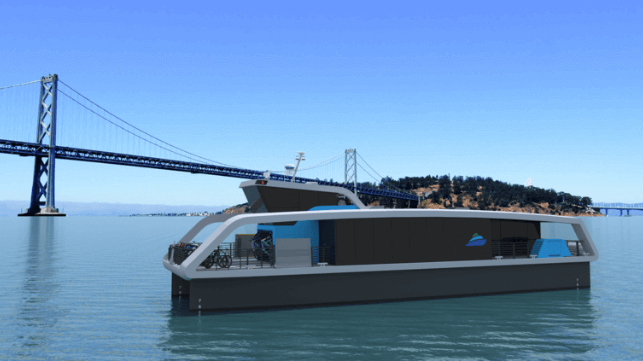Washington State Awards Grant to Test Hydrofoiling Electric Ferry

A county transit agency in Washington State has accumulated more than $5 million in grant funding to design a demonstration-scale electric fast ferry and its shoreside charging infrastructure. The project draws on a 150-passenger vessel design by Glosten and Bieker Boats, and the trial model is designed to prove the technology concept at smaller scale.
If built, the full-scale carbon fiber vessel for Kitsap Transit would be the first hydrofoil electric fast ferry in the region. The agency believes that the hydrofoiling ferry would reduce CO2 by 75 percent and operating cost by 35 percent when compared to diesel-powered fast ferries on the Bremerton-Seattle route.
"This is a reliable, ultra-efficient, low-wake vessel designed to be better for passengers and the environment," said Paul Bieker, partner at Bieker Boats. "This technology represents a giant step forward in efficiency for high-speed transportation over water."
The grant funding pool comes from two state sources. Last week, the Washington State Department of Commerce allocated $1.2 million in R&D funds for the demonstration-scale project. Kitsap Transit previously secured a $4 million grant from the state legislature under Washington's Climate Commitment Act, which allocated $3 billion for public transit projects over the next decade and a half. However, a statewide initiative on the November ballot will ask Washington State's voters to choose whether they want to repeal the Climate Commitment Act, and the results of the vote will determine whether Kitsap Transit's $4 million funding tranche will be available.
If the prototype is successful, Kitsap Transit says that it will seek federal funding to build the full-size vessel. It previously applied for a grant of $18.5 million from the Federal Transit Administration in 2022 to complete the full project, but the application was turned down.
Kitsap Transit's ferry project has backing from the state's maritime innovation accelerator, Washington Maritime Blue, along with three local seaports.
San Francisco Gets $11 Million Grant for High-Speed Electric Ferries

The San Francisco Bay Ferry has secured an $11 million grant from the Federal Transit Administration (FTA) to help purchase the first high-speed electric ferries ever built in the United States.
The San Francisco Bay Area Water Emergency Transportation Authority (WETA), the operator of the ferry service, wants to buy two classes of high-speed electric ferries for new and existing routes. The first phase of the plan calls for three 150-passenger battery electric ferries serving downtown and two up-and-coming waterfront neighborhoods, Mission Bay and Treasure Island.
Together with other contributions from state and local partners, WETA now has more than $130 million set aside to build out its battery-electric fleet and the associated shoreside infrastructure. The construction program calls for a charging float at the downtown terminal, a new charging station at the Treasure Island terminal, and a brand new electric-ready terminal for Mission Bay.
WETA has a design in hand for the 150-passenger vessel model and is soliciting quotes from shipyards; all going to plan, it expects to take delivery of its first battery-electric model in 2026.
In phase two, WETA wants to buy two larger electric ferries capable of moving 400 passengers at a time, and will then convert four of its existing 400-passenger ferries to battery-electric operation.
San Francisco's $11 million award is one of 18 newly-announced federal grants that will underwrite ferry newbuilds and shore infrastructure in 14 states, including eight projects for low-emissions propulsion. The largest single federal grant went to the Alaska Marine Highway System, which received $106 million. The funding will be used to buy a much-needed diesel-electric newbuild vessel to serve Southeast Alaska.
No comments:
Post a Comment